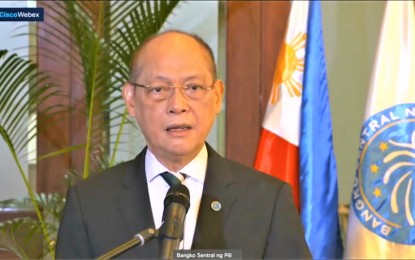
POST-PANDEMIC. BSP Governor Benjamin Diokno speaks during the release of the Second Semester 2020 Financial Stability Report on Wednesday (Nov. 18, 2020). He said businesses and consumers' behaviors are expected to have changes and there is a need to closely look into systemic risks. (Photo taken during the BSP-lead virtual briefing)
MANILA – Authorities will be looking closely for systemic risks on the financial system post-pandemic after noting that businesses and households’ behaviors will change given the new situation.
In a virtual briefing for the release of the 2nd Semester 2020 Financial Stability Report (FSR) Wednesday, Bangko Sentral ng Pilipinas (BSP) and concurrent Financial Stability Coordination Council chairman Benjamin Diokno said consumers’ preference and risk behaviors will change and this will have an effect on how products and services are produced and consumed.
“This new economy is not just a ‘post-Covid’ world. Rather, we expect it to be defined by a different set of market arrangements, changed business models, and distinguished by new behaviors,” he said.
This situation requires “adjusting our lens to account for systemic risks when we oversee the functioning market,” he said.
Diokno said digitalization will have a big part in the economy since people will put greater value on physical space.
“Our goal is to reduce the uncertainties so that all stakeholders can make well-informed decisions,” he said.
In the same briefing, Finance Secretary Carlos Dominguez III described the latest FSR as “a picture of strength in the face of adversity.”
“While it may not be as glowing as last year’s report, it shows how years of work in fortifying our financial sector have prepared us well for this difficult time. More importantly, it demonstrates that we are effectively mitigating the adverse effects of the pandemic on our domestic economy,” he said.
He said the report underscores the need to implement responsive fiscal and monetary policies for the recovery of the domestic economy since “fiscal policy is more than just disbursing public funds and financing deficits.”
“As the global pandemic continues, we must implement timely and effective monetary and fiscal policies. These policies are crucial to the management of evolving systemic risks during this period of general uncertainty. They are also the very tools we are using to build a new and more resilient economy,” he said.
Meanwhile, Insurance Commissioner Dennis Funa said the financial markets constantly evolve and market conditions change, needing for long-term view every time.
He said authorities “cannot dictate market forces and so the bigger issue is the stability of markets, the availability of instruments and the robustness of risk valuations.”
“Our best-case scenario is that we communicate the relevant information so that our financial consumers would be able to make informed choices,” he said.
The report noted the need for a pro-active response as post-pandemic, income impairment and uncertainty will result to risk aversion.
“To move forward, there must be a vision of the future, against which economic agents can craft their transition. That vision anchors expectations and the transition must address the underlying effects of Covid-19. Absent of this, the economy may be facing a slow-burn contagion that no one would prefer,” it said. (PNA)
